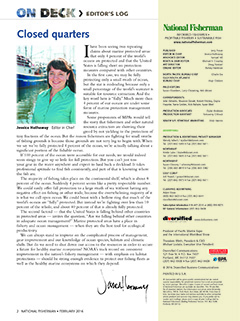Closed quarters
By Jessica Hathaway
I have been seeing two repeating claims about marine protected areas: that only 4 percent of the world’s oceans are protected and that the United States is falling short on protection measures compared with other countries.
In the first case, we may be fully protecting only a small swath of ocean, but the stat is misleading because only a small percentage of the world’s seawater is suitable for resource extraction. And the key word here is “fully.” Much more than 4 percent of our oceans are under some form of marine protection management measures.
Some proponents of MPAs would tell the story that fishermen and other natural resource extractors are showing their greed by not yielding to the protection of tiny fractions of the ocean. But the reason fishermen are fighting for small swaths of fishing grounds is because those grounds are not very big to begin with. When we say we’ve fully protected 4 percent of the ocean, we’re actually talking about a significant portion of the fishable ocean.
If 100 percent of the ocean were accessible for our needs, we would indeed seem stingy to give up so little for full protection. But you can’t just toss your gear in the water anywhere and expect to haul back a deckload. It takes professional aptitude to find fish consistently, and part of that is knowing where the fish are.
The majority of fishing takes place on the continental shelf, which is about 8 percent of the ocean. Suddenly 4 percent seems like a pretty respectable number. We could easily offer full protection to a large swath of sea without having any negative effect on fishing or other trade, because the overwhelming majority of it is what we call open ocean. We could boast with a hollow ring that much of the world’s oceans are “fully” protected. But instead we’re fighting over less than 10 percent of the whole, and about 40 percent of that is already fully protected.
The second factoid — that the United States is falling behind other countries in protected areas — invites the question, “Are we falling behind other countries in adequate ocean management?” Marine protected areas have a place in fishery and ocean management — when they are the best tool for ecological productivity.
We can always stand to improve on the complicated process of management, gear improvement and our knowledge of ocean species, habitats and climatic shifts. But do we need to shut down our access to the resources in order to secure a future for healthy marine ecosystems? NOAA’s track record on consistent improvement in the nation’s fishery management — with emphasis on habitat protections — should be strong enough evidence to protect our fishing fleets as well as the healthy marine ecosystems on which they depend.








.jpg.small.400x400.jpg)